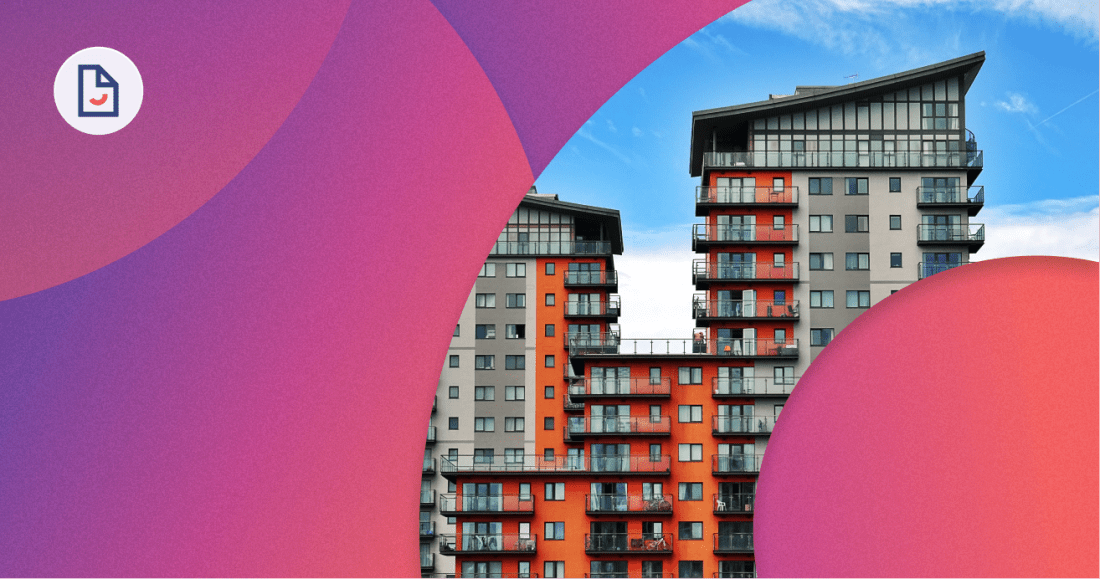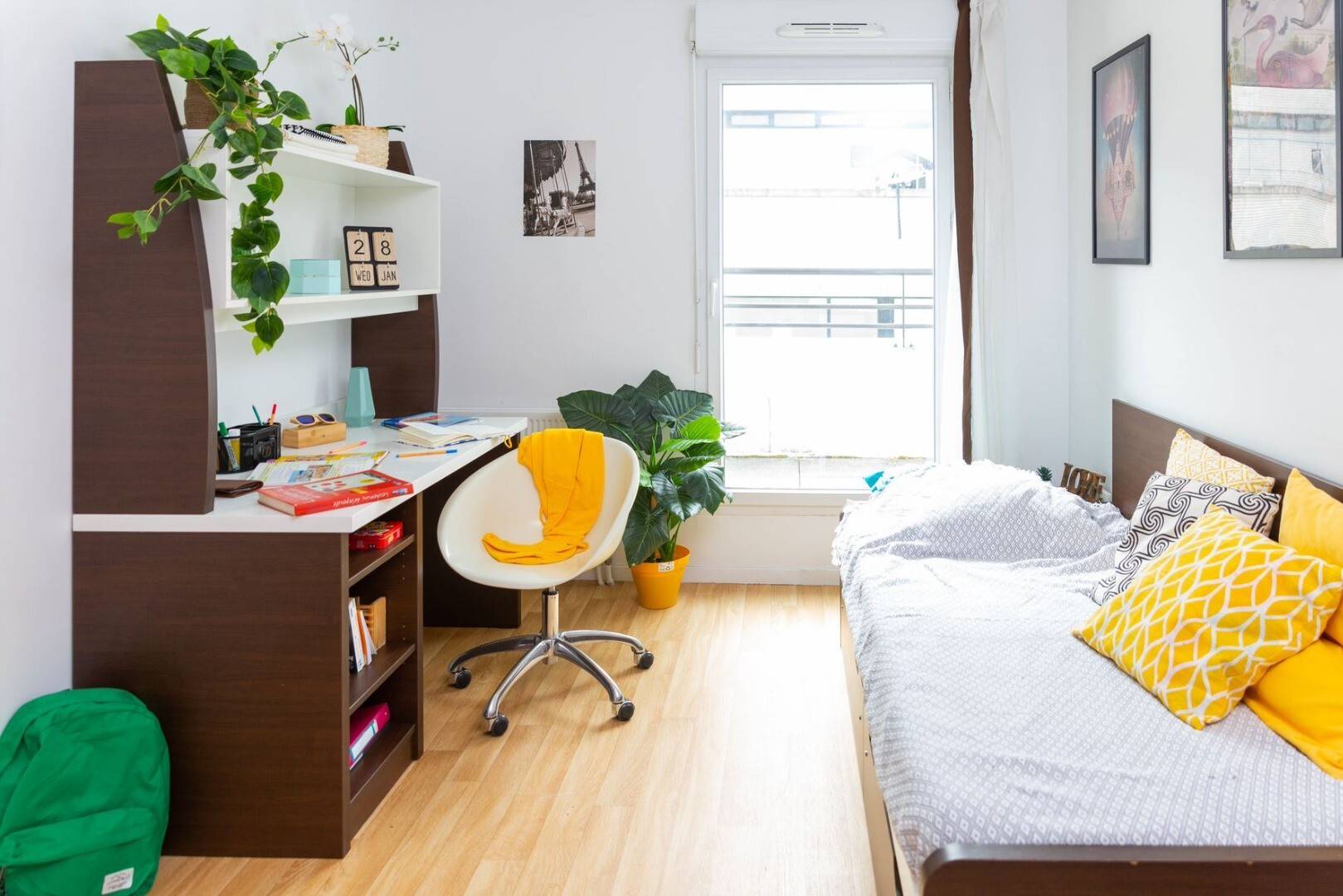
Student residence: secure accommodation for your children
Student residences offer interesting housing solutions: a few steps from universities or schools, students can work there in peace, in a secure environment. Studapart gives you all the information you need to know before taking a room for your child in a student residence: what are the advantages of this option? What are the essential selection criteria? When should you do it? How much does it cost ? We tell you everything!
What is a student residence? Definition
A student residence is a group of furnished apartments most often located near universities, schools, research centers and higher education. The proximity of these school centers generally offers a good network of public transport around.
Most of the time, the accommodation offered is single rooms, fully equipped: furniture, kitchen with fridge, hotplates, microwave oven, bathroom. The residences can also offer additional services: babysitting, laundry, library, self-service, maintenance service, bike storage, etc.
Student residences, unsurprisingly, are aimed at profiles of student tenants, who aspire to a calm living environment, without being isolated.
There are two types of student residences:
- Public student residences: these are CROUS residences, managed by the Ministry of Higher Education and Research and Innovation. Housing is allocated in priority to students receiving a grant, then to all students in a second phase, with priority based on social criteria. In all cases, you will need to compile a Student Social File (DSE) for your request to be considered.
- Private student residences: the budget required for this type of residence is often higher, but they have undeniable advantages. On the one hand, it is easier to find a place there, since there are no particular allocation criteria: first come, first served! On the other hand, the range of services offered there is wider than in a CROUS residence.

Housing your child in a student residence: the important selection criteria
Before deciding on one residence over another, several points should be taken into account.
Location
This is the number one selection criterion. This is one of the main advantages of student residences: they are not far from campuses. The ideal is therefore to find a residence that is as close as possible to the future school or university in which your child will study. In this way, he/she will not waste his/her time in public transport or on the road and will be able to return home between two lessons. Also study the environment close to the residence: are there shops? It is important that the time saved on the home/school journey is not lost afterwards when going to get supplies.
The services offered by the residence
What are the essential services for you? If there is no doubt that Wifi or the laundry are must-haves, you may be ready to make concessions between a table football or ping-pong room for example.
The quality/price ratio
Accommodation is the first item of expenditure for a student. The cost of the room, depending on the services offered, will therefore necessarily be an essential selection criterion. A roommate in a student residence can be an interesting option to reduce this burden.
Put your child in the best conditions to study
Choosing a student residence to house your child during their studies has many advantages:
- They are ideally located: this is their undeniable key asset! Student residences are in the immediate vicinity of universities and schools.
- The student residences offer a super complete service: the rooms and studios are fully furnished and equipped, all you have to do is put down your suitcases! On the other hand, they offer ranges of additional services, more or less important depending on the establishment: cafeteria, cleaning service, laundry, concierge, gym, etc.
- They offer a secure living environment: many student residences have a security service and some also have a remote surveillance system. A certain guarantee of tranquility!
- Everything is included: all charges are included in the price of the accommodation (water, electricity, Internet, etc.), and any problems during the lease are managed by the residence. Your child, or yourself, will not need to manage a Wifi outage or a water leak, for example. Everything is taken care of by the lessor!
- Your child will be able to work in peace... without being isolated: student residences are most often far from the heart of town centres. Sources of distraction will therefore not be too close and your child will be able to study in peace. Student residences are also increasingly offering workspaces, to promote coworking, perfect for group review sessions.
- It is a flexible solution: the rental periods are flexible. There are even short-term rental contracts, between 1 and 6 months. Has your child found an internship in another city? The notice for furnished accommodation in a student residence is only 1 month. Ideal for adapting to the twists and turns of your child's student life.
What type of accommodation to choose for a student? We take a look at all the possible options, and their cost, in our article!
Finding a place in a student residence for your child: when should you go about it?
The demand for places in student residences is very strong, especially in the major student cities (Paris, Lyon, Clermont-Ferrand, Nantes, Nice, Rennes, Lille, etc.). It is therefore essential to start research as soon as possible.
Ideally, therefore, we advise you to start your procedures as early as April, in anticipation of the start of the school year the following September. So of course, the results of the baccalaureate have not yet fallen but precisely... it is at this point that you will have free rein to find student accommodation that meets the most of your criteria! The more you anticipate your search, the more choices you will have.
For a request for accommodation in a public student residence, certain dates and deadlines are to be known, so as not to find yourself in the water:
- Your child can make their wishes for residences on the Crous housing website from May 3 (4 wishes maximum).
- The deadline for submitting applications is May 31.
- The allocation of accommodation in CROUS student residences is done in two stages: in the first phase (from June 13 to July 5), accommodation is allocated as a priority to scholarship students. Then, in a second phase, from July 12, they are then open to all students, with priority for social criteria.
Applying for accommodation at the CROUS, how does it work? We explain everything to you, step by step, in our guide.
Find a student residence for your child with Studapart
Places in student residences are not always easy to find. Studapart helps you find your child's future student accommodation:
- Each year, we offer nearly 80,000 accommodations in student residences with our 550 partner residences.
- Our ambition is to provide our tenants with more and more quality housing to meet growing demand.
- The partnerships that we forge every year with student residence networks allow us to offer more and more student accommodation, often even before they are put on the market.
It can always be useful: our multilingual support team is available 6 days a week to answer all your questions and support you if needed.
How much does a room in a student residence cost?
The amount of the monthly rent for the room depends on several criteria: private or public residence, city in which your child is studying, single room or shared accommodation, extent of the services of the student residence.
- In a public student residence, count between 200 and 500 € per room per month.
- In a private student residence, plan around €500 for a shared room, and between €500 and €900 on average for a furnished studio.